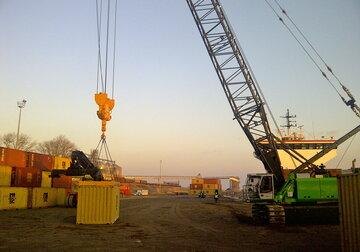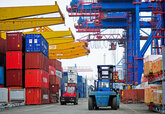
The EBRD has published the details of its investment in Moldova’s Giurgiulesti port, which started in 1995, and denied rumors about acquiring the port for only €1,000.
The European Bank for Reconstruction and Development, in its special message, recalled that in 1995 the Moldovan authorities decided to build a port in Giurgiulesti, which was supposed to be accessible to sea vessels and equipped with a terminal for storing and transshipment of refined petroleum products. The EBRD has offered a $27.5 million financial package consisting of a capital investment loan to support infrastructure development to the Greek-Moldovan S.A. Terminal, which has signed a concession contract with the Moldovan government for the construction and operation of the port. However, from the very beginning there were delays in the project. As a result, the physical work on its development was stopped, and in 1999 the degree of completion was 60%. The EBRD loan was classified as impaired and was transferred to the Bank's Adverse Loan Management Department. After years of negotiations, a compromise was reached at the end of 2004 with the support of all parties involved, including the Moldovan government. As a result of the settlement, 100% of the equity investment and a significant portion of the outstanding debt were written off. Terminal S.A. and a number of Greek banks that supported the initial investment under the auspices of the EBRD withdrew from the project; they were replaced by Azpetrol Group, owned by Azerbaijani citizen Rafiq Aliyev. The first vice president of Azpetrol Group at the time was Thomas Moser, a former EBRD employee. The group of companies, known at the time as Azertrans SRL, Azpetrol Refinery SRL and Azpetrol SRL, signed a Host Investment Agreement with the Moldovan government in December 2004, pledging, among other things, to build various terminals in the port, an oil refinery and create a network of about 50 filling stations in Moldova. The total investment of the three mentioned companies was expected to reach $250 million during the 25-year term of the Host Investment Agreement. The Moldovan government - among other forms of assistance, provided a subsidy of 1 billion lei to the company Bemol Retail in 2008-2015 to facilitate the implementation of investments agreed with the three companies. In June 2006, Rafiq Aliyev's Azpetrol group sold its Moldovan subsidiaries to Easeur Holding BV (Easeur) and renamed Azertrans SRL as Danube Logistics SRL, Azpetrol Refinery SRL as Bemol Refinery SRL (Bemol Rafinery), and Azpetrol SRL as Bemol Retail SRL (Bemol Retail). In November 2009, Thomas Moser resigned from the position as one of Rafiq Aliyev's trustees and acquired Easeur, including its subsidiaries Danube Logistics, Bemol Retail SRL and Bemol Refinery SRL, from New Ventures Capital NV, owned by Rafiq Aliyev. In 2006, the EBRD turned to a specialized distressed fund, Credit Suisse, as no commercial financial institution was willing to finance the completion of the project. Credit Suisse started financing the project in early 2007. Easeur was unable to refinance a defaulted senior debt of $28.6 million to Credit Suisse that was used to finance the development of the port infrastructure and the gas station network. The loan carried a default interest of $3.7 million per year. In order to avoid liquidation of Easeur and its subsidiaries in Moldova, all parties reached a compromise stipulating that Easeur and Bemol Retail SRL will pay off the debt of $28.6 million to Credit Suisse in exchange for their shares in Danube Logistics, which were transferred to Danube Logistics Holding BV. These rights included an Easeur’s 80% stake in Danube Logistics SRL that was acquired for $344.6, Easeurs loan receivables from Danube Logistics SRL that were acquired for $14.9 million, and Bemol’s loan receivables from to Danube Logistics that were acquired for 163 million lei (equivalent to $13.7 million). The deal was based on an independent appraisal by a renowned Dutch port appraisal company, which consulted with Rafiq Aliyev's trustees and their financial advisor. As the company's debts were significantly higher than the value of the independently established company, Danube Logistics Holding BV acquired 80% of Easeur shares for $344.6. This amount was equivalent to the cumulative equity investment attributable to this block of shares at that time. According to the EBRD, Credit Suisse became the main economic beneficiary of Danube Logistics Holding BV and, in exchange for a commitment not to accelerate the loan repayment, agreed to receive income of up to 65% of future dividends, as well as from any future sale of assets or shares of Danube Logistics. Thomas Moser was appointed General Manager of the Giurgiulesti Port. The deal was completed in November 2011 following a peaceful compromise between all parties. In February 2013, the EBRD refinanced the outstanding debt of Danube Logistics Holding BV to Credit Suisse and replaced Credit Suisse as the main economic beneficiary of Danube Logistics Holding BV's stake in Danube Logistics, entitled to 65% of any share sale or dividend income based on a participation agreement concluded in accordance with English law. After Rafiq Aliyev reacquired the Easeur group in 2014, Easeur, Bemol Retail SRL and New Ventures Capital NV have made numerous attempts to reverse the compromise to try to gain control of Giurgiulesti port, claiming that the deal underestimated Danube Logistics. This lawsuit was dismissed by a final and irrevocable decision of the Amsterdam Court of Appeals in September 2018. In the same year, the High Court of England and Wales also dismissed a personal lawsuit against Thomas Moser in connection with this transaction. Two more claims by Easeur and Bemol Retail SRL were dismissed by the Moldovan courts in December 2018 and March 2019. In addition to the claim to invalidate the purchase of Danube Logistics by Danube Logistics Holding BV in 2011, Rafiq Aliyev's company, Bemol Retail SRL, filed a lawsuit in person against Thomas Moser, seeking compensation for the alleged loss of profits that Bemol Retail SRL claims it incurred as a result of Moser's management of Bemol Retail SRL until August 2012. In October 2019, the Chişinău Court of Appeal issued a judgment against Moser in his personal capacity to pay damages of MDL 177.4 million to Bemol Retail. Moser’s challenge to this judgment is pending before the European Court of Human Rights. As noted by the EBRD, While Bemol Retail’s claim is against Moser and is unrelated to Danube Logistics and Danube Logistics Holding BV, Moldovan bailiffs, acting on behalf of Bemol Retail, have nevertheless since 2019 imposed a sequester on Danube Logistics Holding BV’s shareholding in Danube Logistics, ordered a sequester on payments from Danube Logistics to Danube Logistics Holding BV and ordered the forced administration of the shareholding in Danube Logistics. The EBRD has submitted documentary evidence to the Moldovan courts confirming that it has been the primary economic beneficiary of Danube Logistics Holding BV’s shareholding in Danube Logistics since 2013 and that the shares in Danube Logistics are pledged as security for the EBRD’s outstanding loan to Danube Logistics. A court dispute regarding the legality of the bailiffs’ actions is ongoing. On 18 March 2021, the EBRD announced that it was taking action to enforce its legal rights to protect its investment in, and the continued operations and the going concern of, Giurgiulești Port. On 7 May 2021, the EBRD acquired 100% of the capital of the Danube Logistics group of companies and thereby became the sole ultimate owner of Danube Logistics, the operator of Giurgiulești Port. The change in the ultimate beneficial ownership of Danube Logistics was registered by the State Registry of Legal Entities in Moldova on 18 May 2021. Answering the most frequently asked questions, the EBRD reiterated in its message that from May 7, 2021 the EBRD became the sole legal owner of Danube Logistics, operator of the Giurgiulesti port, and the goal of this step is to protect the port's operations, a strategic asset for Moldova, and to protect the EBRD's financial interests in the project. It is emphasized that the port owes the EBRD a significant amount of money after the financial restructuring, which was necessary to overcome the difficulties that the asset faced from the very beginning. When asked why the EBRD bought the port, knowing that ownership of it was in dispute, the bank clarified that ownership of the port was not subject to litigation. The dispute on this matter has already been considered and finally settled by the Dutch and Moldovan courts. However, efforts are currently being made to settle the alleged personal claim against Thomas Moser by using the assets and shares of Danube Logistics owned by Danube Logistics Holding BV, which, in the opinion of the EBRD, as the actual main economic beneficiary, is erroneous and incorrect. The EBRD, answering other frequently asked questions, noted that the bank did not privatize the port. The land on which the port is located belongs to Moldova. Danube Logistics builds, operates and expands the Giurgiulesti port under a 99-year concession. Answering the question whether the port is now a foreign property through the EBRD, the bank stressed that from the very beginning, in the 1990s, the Moldovan authorities sought to attract foreign investments for the design, development and operation of the Giurgiulesti port project. International investors have owned the project since its inception. When asked whether the EBRD received government approval for the acquisition of the port operator, the bank drew attention to the fact that the investment agreement does not require such approval. When asked why the deal took place in Cyprus, where the EBRD's mandate ended, the bank replied that the EBRD's investment is guided by the impact it has on the economies of the countries in which it operates. By acquiring a Cyprus-registered ultimate beneficiary of the Moldovan port operator, the EBRD contributes to the development of Moldova's key infrastructure in line with its mandate. At the same time, the EBRD denied rumors that it had paid only €1,000 for the port. "It is not true. The document circulated in certain media shows the nominal value of shares of Thomo Invest Ltd, the former indirect owner of Danube Logistics, which the EBRD acquired on 7 May 2021. The value of the transaction is different and remains confidential,” the EBRD noted. It has also vehemently denied accusations that the EBRD has submitted forged documents for port registration / bail enforcement. “We categorically deny such allegations. The EBRD, its staff and lawyers abide by the highest ethical standards, integrity and good governance in all business operations. We have asked the Ministry of Justice to clarify the discrepancy between the pledge registration document that was issued to the EBRD and the one circulated in the media. We reserve the right to take legal action, if and when necessary, against any defamatory, libellous or slanderous accusations,” the EBRD said. Commenting that EBRD staff were personally accused of misconduct and the bank was accused of supporting Thomas Moser in misappropriation of property, the EBRD said it categorically rejects any such accusations, stressing that EBRD staff adhere to the highest ethical standards, integrity and good management in all business operations and have the full confidence of the bank. The EBRD is owned by 69 countries, including Moldova, as well as the European Investment Bank. With a total investment of €1.4 billion, the EBRD is the largest institutional investor in Moldova. // 29.06.2021 – InfoMarket







